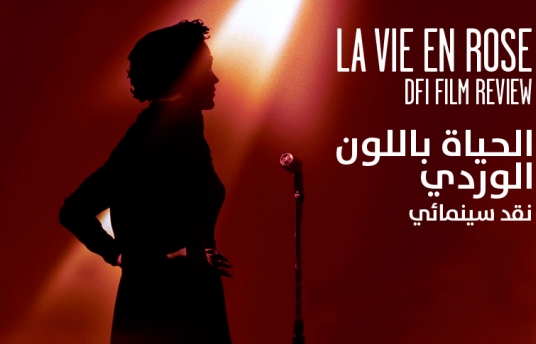DFI Film Review: La Vie en Rose (2007)
Jun 19, 2011

Written by Reem Saleh, New Media, DFI
Film: La Vie en Rose
Year: 2007
Director: Olivier Dahan
Stars: Marion Cotillard, Sylvie Testud, Pascal Greggory
Genre: Biography, Drama, Music
La Vie en Rose (literally ‘Life in Pink’), is a biopic of France’s legendary singer Edith Piaf. The title refers to Piaf’s signature song, which has been translated into many languages, interpreted by the biggest names in music. The film was released in France as ‘La Môme’ (the little bird), a reference to Piaf’s nickname at the beginning of her career. The film tells the story of Piaf from childhood to her deathbed while highlighting the most important events of her dramatic life, from singing in the streets of Paris to the world of fame, heartbreak and internal struggles. It is a fascinating journey of an immortal voice.
The film moves un-chronologically to and from childhood, in cause-effect sequences showcasing the consequences of her childhood in her present, her songs and personality.
Piaf’s (Marion Cotillard) life is very intriguing. While her father was on the battlefields of WWI, her mother abandoned her to pursue a career as an artist. He returns to find her ill and neglected. He then abandons Piaf to his mother, who runs a brothel. Being exposed to the harsh life of the girls in the brothel, she nevertheless was protected by them, especially Titine (Emmanuelle Seigner) who treated her as her own child. A few years later, father who has been working as an acrobat at a circus comes back for his daughter, much to the distress of Titine. Her father soon becomes unemployed and decides to perform in the streets of Paris, dragging his 9 year-old child with him into her first public performance. She was forced to perform, and it is at this moment when she decides to use her voice and sing ‘La Marseillaise’. The streets work to her advantage when years later she is discovered by nightclub owner Louis Leplée (Gerard Depardieu) who guides her to stardom. Soon this young girl from the streets becomes a fable to be told and re-told for many generations to come.
It is one of those splendid film moments I haven’t had in a while. The film was released in 2007 and for those who haven’t seen it yet, including myself it is an enjoyable yet moving experience whether you’re a fan of Piaf or not.
As much as Piaf stole the hearts of millions all around the globe, the performance of Marion Cotillard playing the role of this legendary star is no less breathtaking. It made the film worthy of being called an eligible tribute to the great singer. She didn’t just act; she embodied the role so completely I forgot she was acting a part. She was at one with Piaf.
It is very difficult to impersonate a character but Cotillard worked on every aspect of her acting, from body language, voice and facial expressions. Her lead role paid off. She definitely deserved the Oscar she won for this performance, the first ever for a French-speaking role. I can’t but admire her outstanding performance, and critics agree, regardless of their opinion on the film.
When we talk Piaf, we must then mention the music as well. DFI had the privilege to talk with Christopher Gunning composer of the musical score of the film that awarded him a BAFTA film award for best music. Talking about the film he adds “It’s an interesting case because the director decided right from the very beginning that there was going to be a proper score, quite in addition and quite separate from the songs, but of course I had to take into account what the songs were like.” His efforts paid off resulting in an incredible soundtrack worthy of anyone’s music collection.
All the success following the film, more than 30 awards in different festivals, wouldn’t have happened without the talent of the wonderful director Oliver Dahan, who mixed all elements magically. An expressive image with beautiful cinematography complements the back and forth between Piaf’s early age and her last days. He managed to create strong nostalgia, which was probably the best way to portray her state of mind and inner feelings towards a past that never really left her. The songs performed during the film where specifically chosen to link different periods of her life with her inner struggles.
The film focused solely on Piaf, I must admit that I have some questions regarding the fate of some characters we got familiar with. This is probably my only mild reproach on the film. I wanted to know what happened to her father and to Titine. I wanted to know more about the people around her all the time. In following her life so closely, the lives of those around her were left undeveloped. It is surely impossible to cover all aspects of a life on film. One certainly has to be selective. But within this editorial interpretation many characters were left to vanish as the storyline developed.
This doesn’t stop the film from remaining inspirational with visuals that would capture its viewers and throw them into the realms of this passionate and dark character. What a beautiful journey, of a girl from the slums, whose voice became more symbolic than the Eiffel tower.
La Vie En Rose - Trailer
إعلان فيلم لا في آن روز (الحياة باللون الوردي)